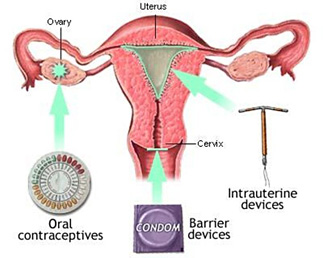FAMILY PLANNING
An unwanted and unplanned pregnancy at any age and stage of life can be very traumatic experience for the couple. It is always a better idea to plan a family when one is prepared for it and circumstances are suitable. There are different contraceptive methods which women or her husband can use at different phases of their lives.

ORAL CONTRACEPTIVE PILLS (OCP)
- For a young woman who does not have any children, one of the best methods is oral contraceptive pills. Nowadays, ultra low dose pills are available which have fairly low quantity of hormones. These have to be started from the second or third day of your periods and continued daily for 21 days.
- Once the packet is over , you stop the pills and wait for your periods. You can restart the next packet of pills from day 2/ 3 of your periods. You are protected in the pill free period between the two packets. This gives very good protection against pregnancy.
- Inaddition to this, the OCP (oral contraceptive pills) have other beneficial effects such as regularising periods/ menses, reduction in bleeding during periods and decrease in acne etc.
- However OCP cannot be taken by everyone. It should be avoided by women having or recovering from jaundice, having diabetes, migraines or history of thrombosis etc. Also breast feeding mothers cannot take the usual contraceptive pills. These women who are breast feeding can take ‘minipill’ or progesterone only pill, which has no detrimental effect on breast milk.
INTRAUTERINE CONTRACEPTIVE DEVICES (COPPER T)
- Copper-T or intrauterine contraceptive device (IUCD) can be inserted by women who have had one child. There are different varieties available, those which last for 3, 5, 7, or even 10 years.
- These have to be inserted inside the uterine cavity by the gynaecologist. This can be done in the OPD and does not require anaesthesia. It take only a few minutes to insert into the womb. The women is instructed to feel for the thread of the IUCD / CU –T. The first periods after the insertion may be heavy in some women, If the women wants to get it removed at a later date to plan next pregnancy or otherwise, it can be very easily removed within a few minutes in the OPD.
- Some women may experience heavy bleeding in the following months after CU-T insertion.
- There is now a new hormone containing copper-T called LNG-IUD (eg MIRENA) which is more effective than the previous ones and has the added benefit of reducing or even temporarily stopping menstrual bleeding. This device can even be used as a treatment for heavy bleeding.
CONDOMS
- Condoms can be used by the male partner for contraception
- Sometimes improper use may lead to its failure. It could be due to break or tear in the condom.
- It is best to combine use of condom with spermicidal jelly or vaginal tablets and with the safe period of the woman.
EMERGENCY CONTRACEPTION
- If the condom tears or leaks or the woman forgets her pills, emergency contraception should be used within 72 hours of unprotected sex. These are available in the form of hormone tablets.
TUBAL LIGATION
- It is the permanent method of contraception in which the fallopian tubes are blocked surgically.
